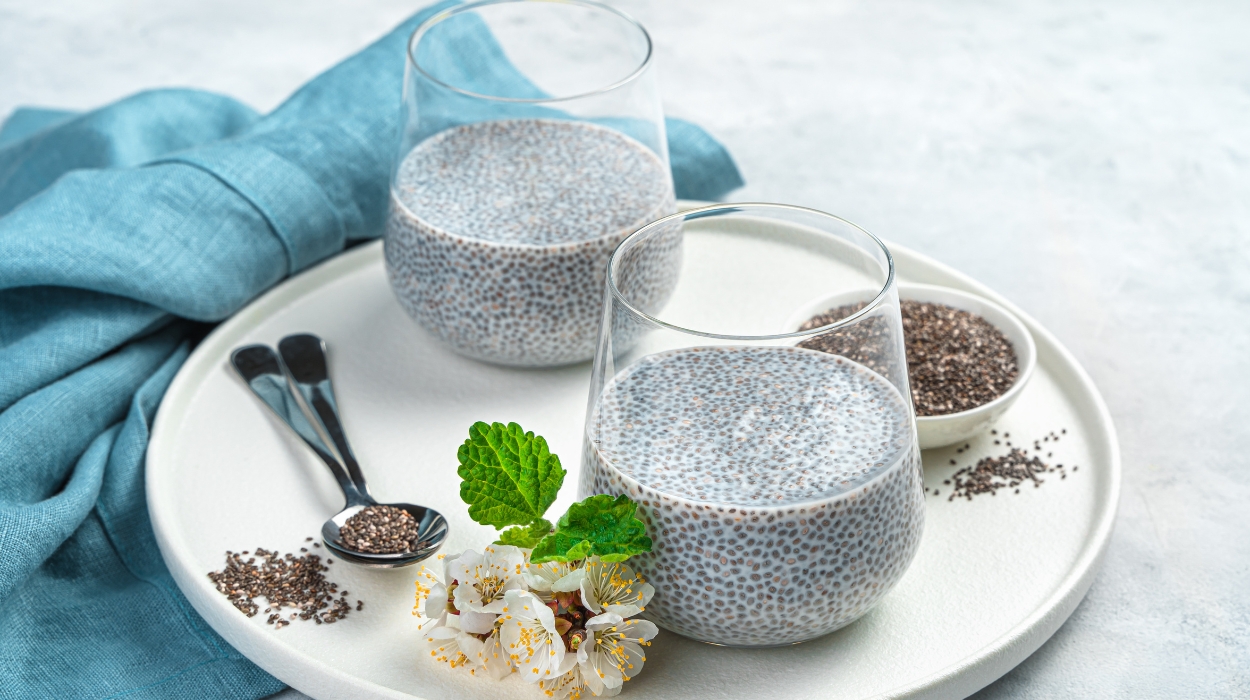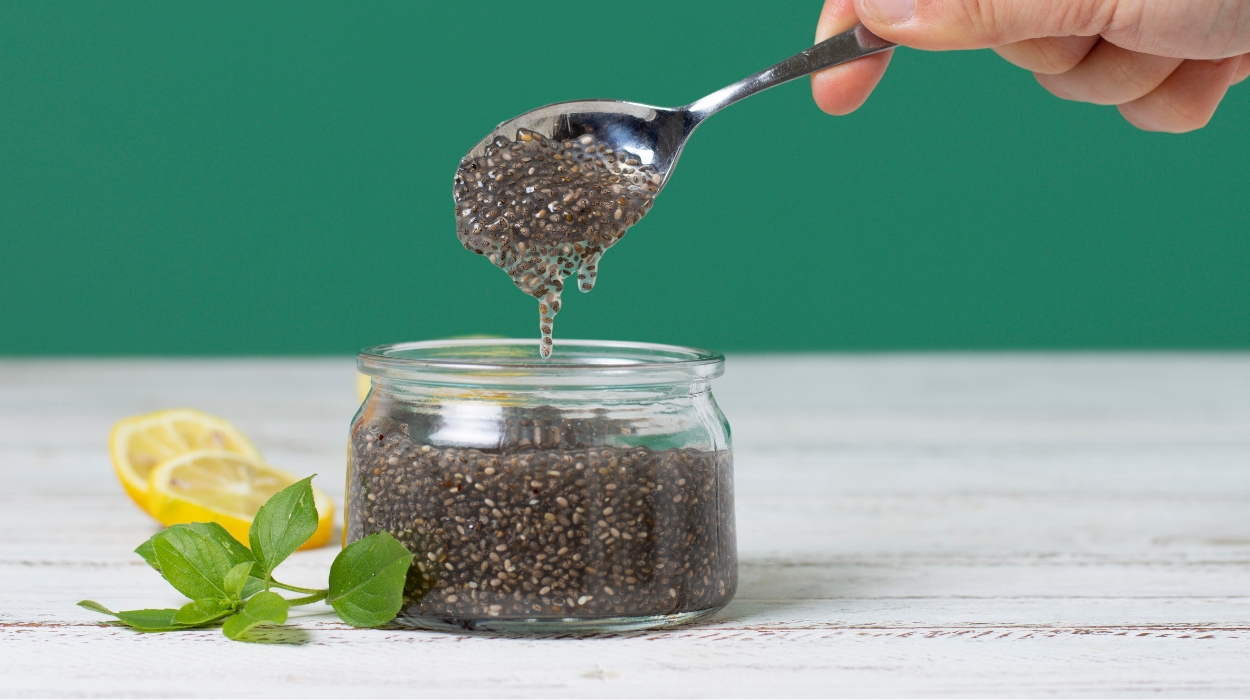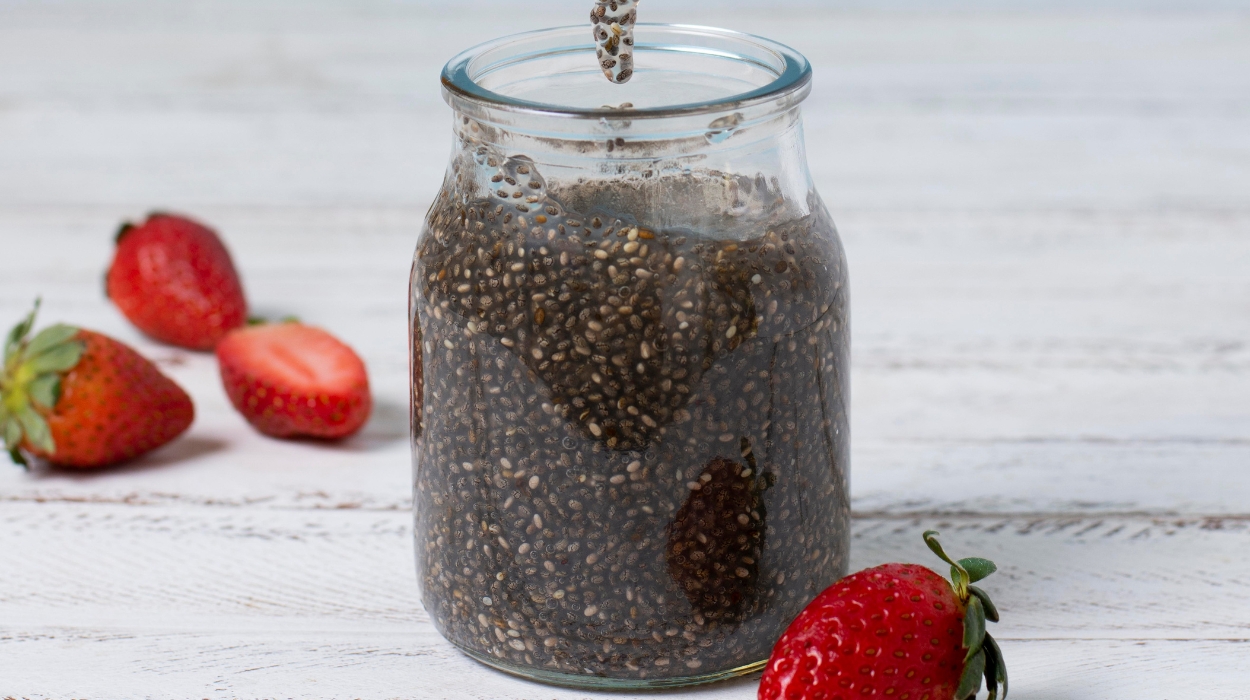 Expert's opinion
Expert's opinion
Expert's opinion
The article is a subjective view on this topic written by writers specializing in medical writing.
It may reflect on a personal journey surrounding struggles with an illness or medical condition, involve product comparisons, diet considerations, or other health-related opinions.
Although the view is entirely that of the writer, it is based on academic experiences and scientific research they have conducted; it is fact-checked by a team of degreed medical experts, and validated by sources attached to the article.
The numbers in parenthesis (1,2,3) will take you to clickable links to related scientific papers.
Can Babies Have Chia Seeds? Exploring The Benefits & Precautions 2024

Introducing solid foods to babies is an exciting milestone, and parents often wonder which nutritious options to include in their little one’s diet. Chia seeds have gained popularity among health-conscious adults due to their numerous health benefits, but can babies have chia seeds too? In this article, we will delve into the topic of introducing chia seeds to babies and explore their potential benefits and drawbacks.
Can Babies Eat Chia Seeds?
Yes, babies can have chia seeds, but it is important to introduce them at the appropriate time and in the right form. Chia is packed with essential nutrients, including omega-3 fatty acids, fiber, protein, and calcium. They not only provide essential nutrients but also contribute to significant therapeutic effects[1] that aid in preventing nutrition-related diseases. However, certain factors should be taken into consideration before incorporating chia into a baby’s diet.
Can Babies Have Chia Seeds?
Chia seeds can be introduced to babies at the appropriate age: between six and eight months of age, after they have started consuming solid foods and their digestive system has matured. It is important to note that every baby is different, and it is always recommended to consult your pediatrician before introducing any new food to your baby’s diet.
By six to eight months, babies typically can sit up with support and show interest in self-feeding. They may have started eating mashed or pureed fruit, vegetables, and cereal. This is an appropriate time to consider introducing chia seeds.
Start by incorporating chia seeds into baby food, purees, or smoothies, ensuring they are properly soaked or mixed to avoid any choking hazards. Observe your baby’s reaction and look for signs of any adverse effects or chia seed allergies.
Chia Seeds During Pregnancy

For mothers, incorporating chia seeds into the diet during pregnancy can provide numerous benefits. The omega-3 fatty acids in chia seeds support the development of the baby’s brain and eyes, while the fiber content helps prevent constipation and promotes healthy digestion.
Chia seeds also offer a natural source of calcium, which is crucial for the baby’s bone and teeth development, and iron, which helps prevent anemia. Chia seeds can increase milk production for lactating mothers. Incorporating chia seeds into your diet during pregnancy is a simple and effective way to enhance overall nutrition and support the health and well-being of both mother and baby.
Benefits Of Chia Seeds For Babies
Chia seeds provide a range of benefits for babies, including improved digestion and brain development.
- Improve Digestive Health: Chia is rich in dietary fiber, which can aid in maintaining healthy digestion and preventing constipation in babies.
- Promote Brain Development: The omega-3 fatty acids[2] found in chia seeds are essential for brain development and cognitive function.
- Support Bone Health: Chia seeds contain calcium and phosphorus, crucial minerals for healthy bone development in growing babies.
- Boost Energy Levels: The combination of fiber, protein, and healthy fats in chia seeds can provide sustained energy for active babies.
- Aid in Nutrient Absorption: Chia seeds help enhance nutrient absorption in the body, ensuring that babies receive maximum benefits from their diet.
Enhancing Digestive Health With Chia Seeds For Toddlers
Chia seeds are a valuable addition to a baby’s diet when it comes to improving digestive health. The high fiber content[3] of chia seeds promotes regular bowel movements and prevents constipation in infants. Additionally, chia seeds form a gel-like substance when soaked in liquid, which can aid in maintaining proper hydration and softening stool consistency.
How Much Chia Seeds Can Your Baby Eat?
When starting to introduce chia seeds to your baby, offer half a teaspoon[4] of chia seeds mixed with baby food or pureed fruit. Observe your baby’s reaction and ensure they tolerate the seeds well before increasing the portion size. As a general guideline, add chia seeds to your baby’s diet once or twice a week.
Caution When Giving Chia Seeds To Babies
It’s crucial to be cautious when serving chia seeds to babies and monitor for any potential allergies or digestive sensitivity:
- Allergies: Chia seeds are not a common allergen, but any new food can cause allergies.
- Choking Hazard: Chia seeds, when consumed in dry form, can pose a choking hazard[5] for babies. Always serve chia seeds that are properly soaked or mixed into foods to avoid any risk.
- Digestive Sensitivity: Some babies may have digestive sensitivity to chia seeds. If you notice any signs of discomfort, such as bloating, gas, or diarrhea, discontinue chia seed consumption and consult with your pediatrician.
Don’t Feed Dry Chia Seeds To Your Baby

It is critical not to give your baby dry chia seeds. Dry seeds can expand in the throat and pose a choking hazard. Always soak chia seeds in water, breast milk, or formula before feeding them to your baby. The pre-soaked chia seeds become gel-like and are easier for babies to consume and digest, and allow for delicious recipes such as chia seed pudding.
Understanding Simple And Safe Methods
Preparing chia seeds for your baby using simple and safe methods is of utmost importance to ensure their safety and optimal digestion. Chia seeds have a unique ability to absorb liquid and form a gel-like consistency, which can pose a choking hazard if not prepared correctly. Additionally, following safe preparation methods helps integrate them seamlessly into your baby’s meals while enhancing their texture and taste.
How To Prepare Chia Seeds For Babies?
Here are simple methods and meal ideas to prepare chia seeds for your baby:
- Soaking Method: Take one tablespoon of chia seeds and mix them with three tablespoons of water, milk, or formula and soak. Stir well and let sit for approximately 10 minutes until the seeds form a gel-like consistency. You can then mix this chia seed gel with baby food, purees, or smoothies.
- Chia Pudding: Another way to give your baby chia seeds is by making chia seed pudding. Blend one tablespoon of chia seeds with half a cup of breast milk, formula, or pureed fruit. Store chia seeds in the refrigerator for a few hours or overnight until it thickens into a pudding-like texture.
Conclusion
In conclusion, introducing chia seeds to your baby’s diet can provide a range of health benefits, including improved digestion, essential nutrient intake, and support for overall growth and development. However, it is crucial to follow the recommended guidelines and exercise caution to ensure your baby’s safety and well-being.
Starting chia seeds at the appropriate age, typically around six to eight months, allows for a well-established digestive system and readiness for solid foods. Begin with small quantities and gradually increase the portion size, observing your baby for any potential allergic reactions or digestive sensitivity. Consulting with your pediatrician before introducing chia seeds is always advisable, as they can provide personalized guidance based on your baby’s specific needs and health considerations.
As with any new food, closely monitor your baby’s reactions and watch for any signs of discomfort or adverse effects. If you notice any unusual symptoms, such as rashes, swelling, or digestive issues, discontinue the use of chia seeds and seek guidance from your healthcare provider.
Frequently Asked Questions
Chia seeds are suitable for most babies, but it’s important to introduce them at the appropriate age and monitor for allergic reactions or digestive sensitivity. Consult with your pediatrician before introducing chia seeds to your baby.
While chia seeds are not a common allergen, there is a risk of allergies. Start by offering a small amount and closely monitor your baby for any signs of an allergic reaction, such as rash, swelling, or difficulty breathing.
Chia seeds are rich in fiber, which promotes regular bowel movements and helps prevent constipation in babies. The gel-like consistency of soaked chia seeds also aids in maintaining hydration and softening stool.
Start with small quantities, around half a teaspoon, and gradually increase the amount over time. Aim to include chia seeds in your baby’s diet once or twice a week.
+ 5 sources
Health Canal avoids using tertiary references. We have strict sourcing guidelines and rely on peer-reviewed studies, academic researches from medical associations and institutions. To ensure the accuracy of articles in Health Canal, you can read more about the editorial process here
- Motyka, S., Skała, E., Ekiert, H. and Szopa, A. (2023). Health-promoting approaches of the use of chia seeds. Journal of Functional Foods, [online] 103, pp.105480–105480. doi:https://doi.org/10.1016/j.jff.2023.105480.
- Norlaily Mohd Ali, Swee Keong Yeap, Wan Yong Ho, Boon Kee Beh, Sheau Wei Tan and Soon Guan Tan (2012). The Promising Future of Chia,Salvia hispanicaL.. Journal of Biomedicine and Biotechnology, [online] 2012, pp.1–9. doi:https://doi.org/10.1155/2012/171956.
- Ashura Abdul Katunzi, Lilian Daniel Kaale, Kibazohi, O. and Rweyemamu, L. (2021). Nutritional, health benefits and usage of chia seeds (Salvia hispanica): A review. [online] ResearchGate. Available at: https://www.researchgate.net/publication/349672865_Nutritional_health_benefits_and_usage_of_chia_seeds_Salvia_hispanica_A_review.
- Menal-Puey, S., Martínez-Biarge, M. and Marques-Lopes, I. (2018). Developing a Food Exchange System for Meal Planning in Vegan Children and Adolescents. Nutrients, [online] 11(1), pp.43–43. doi:https://doi.org/10.3390/nu11010043.
- Dickens, B., Sassanpour, M. and Bischoff, E.L. (2023). The Effect of Chia Seeds on High-Density Lipoprotein (HDL) Cholesterol. Cureus. [online] doi:https://doi.org/10.7759/cureus.40360.



